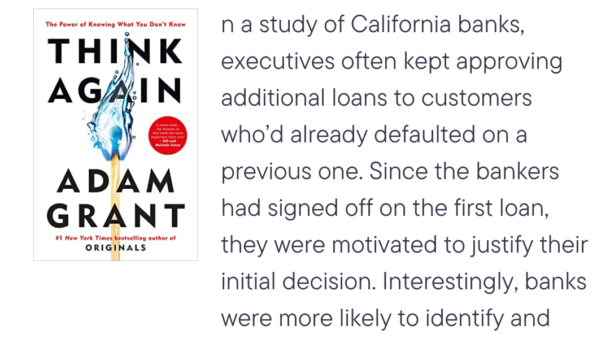Requiring proof is an enemy of progress. This is why companies like Amazon use a principle of disagree and commit. As Jeff Bezos explained it in an annual shareholder letter, instead of demanding convincing results, experiments start with asking people to make bets. “Look, I know we disagree on this but will you gamble with me on it?” The goal in a learning culture is to welcome these kinds of experiments, to make rethinking so familiar that it becomes routine. Process accountability isn’t just a matter of rewards and punishments. It’s also about who has decision authority. In a study of California banks, executives often kept approving additional loans to customers who’d already defaulted on a previous one. Since the bankers had signed off on the first loan, they were motivated to justify their initial decision. Interestingly, banks were more likely to identify and write off problem loans when they had high rates of executive turnover. If you’re not the person who greenlit the initial loan, you have every incentive to rethink the previous assessment of that customer. If they’ve defaulted on the past nineteen loans, it’s probably time to adjust. Rethinking is more likely when we separate the initial decision makers from the later decision evaluators.
I’ve been in situations where you’ve needed to have “data” or “proof” for any suggestion that you raise. While being empirically driven makes sense on the surface, taking it to the extreme and using it as a “weapon” against people that you might not like doesn’t really lend towards a learning culture. After all, it is easy to cherry pick “data” to support your arguments and if one requires proof for everything, being data-driven might actually be the enemy of innovation.
Ultimately, you don’t want to have a team where the best debaters make all the decisions. It is not always the case that the best debaters have the best judgement. Sometimes, it is better to take a step back and give someone time to formulate their arguments whenever you find some level of resistance to your suggestions. Usually, there are some tacit concerns that cannot be verbalised at that moment in time.



